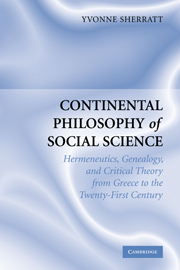Book contents
- Frontmatter
- Contents
- Preface
- Continental Philosophy of Social Science
- Introduction
- PART I THE TRADITION OF HERMENEUTICS
- Introduction
- 1 Ancient Hermeneutics
- 2 Biblical Hermeneutics
- 3 German Philosophical Hermeneutics: Enlightenment and Romanticism
- 4 German Philosophical Hermeneutics: Phenomenology and Existentialism
- 5 Continental Philosophical Hermeneutics Post War
- PART II THE TRADITION OF GENEALOGY
- PART III CRITICAL THEORY
- Conclusion
- Bibliography
- Index
5 - Continental Philosophical Hermeneutics Post War
Published online by Cambridge University Press: 23 November 2009
- Frontmatter
- Contents
- Preface
- Continental Philosophy of Social Science
- Introduction
- PART I THE TRADITION OF HERMENEUTICS
- Introduction
- 1 Ancient Hermeneutics
- 2 Biblical Hermeneutics
- 3 German Philosophical Hermeneutics: Enlightenment and Romanticism
- 4 German Philosophical Hermeneutics: Phenomenology and Existentialism
- 5 Continental Philosophical Hermeneutics Post War
- PART II THE TRADITION OF GENEALOGY
- PART III CRITICAL THEORY
- Conclusion
- Bibliography
- Index
Summary
In the final section of our portrayal of hermeneutics we shift our scrutiny to a thorough inspection of the trends of the latter half of the twentieth century. Many of the thinkers addressed here are prominent across all the multifarious disciplines that comprise the contemporary humanities. They exert an almost palpable influence upon philosophical, epistemological and exegetical debates throughout the social and political sciences, literature, history, law and theology. Moreover, their works are influential through being seized upon (rather inappropriately) as methodologies, no more so than in the social sciences. However, we shall continue to see the distinctively humanistic influences of an almost overriding concern with matters of language, tradition and history which distinguish contemporary hermeneutics from the sciences and methodological approaches of the social sciences.
The most influential figure of this twentieth-century interpretative theory is Hans-Georg Gadamer. His ideas inform a score of other thinkers and schools, most notable of whom are Ricoeur and Derrida from structuralist and deconstructionist schools. Furthermore, Gadamer provokes fairly impassioned debate especially from critical theorists like Habermas. We begin with a thorough-going account of Gadamer's own ideas before moving on to assess his successors.
HANS-GEORG GADAMER
Gadamer, in contrast to the other figures discussed, intersects with our own life and times. He was born in 1900 and lived to see the beginning of the twenty-first century. He was a student of Heidegger and he worked in the universities of Marburg and Heidelberg.
- Type
- Chapter
- Information
- Continental Philosophy of Social Science , pp. 85 - 118Publisher: Cambridge University PressPrint publication year: 2005

